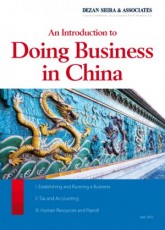China to Allow One Location/Multiple Office Registrations
China has recently announced its decision to simplify companies’ registration and establishment procedures. In the recent “Opinions of the State Council on Further Supporting Employment and Entrepreneurship” (Guo Fa [2015] No.23, promulgated by the State Council on April 27, 2015) the announcement clarifies that the National Organization Code Certificate and Tax Registration Certificate will no longer be issued separately. Instead, the local Administration for Industry and Commerce (AIC) will issue a special business license to enterprises with both organization code and tax registration code on it. Further, the AIC is looking to implement a unified “business registration code” to replace the current three codes for company registration within this year. Multiple entities will be allowed to list the same registered address on their respective license.
![]() RELATED: New Features of a Business License in China
RELATED: New Features of a Business License in China
This news has a significant impact on the professional services industry and especially those involved in corporate registrations and corporate secretarial work. While previously businesses had to be in a specific business premises and were not allowed to share locations with any other company, this ruling means that offices may be shared and contain multiple companies, opening up scope for managing corporate secretarial work as is common in countries such as Singapore and Hong Kong. It also further liberalizes the serviced offices industry, which has had to operate in China under very specific agreements, and paves the way for ‘virtual offices’ to be operational in China.
Chris Devonshire-Ellis of Dezan Shira & Associates comments “This is good news for foreign entrepreneurs as it will allow low cost, shared rental of premises at start up or early investment stages when capital is often tight. It also opens the door for co-sec services to start to take hold in China which will again reduce costs and promote an additional aspect of the professional services industry.”
|
Asia Briefing Ltd. is a subsidiary of Dezan Shira & Associates. Dezan Shira is a specialist foreign direct investment practice, providing corporate establishment, business advisory, tax advisory and compliance, accounting, payroll, due diligence and financial review services to multinationals investing in China, Hong Kong, India, Vietnam, Singapore and the rest of ASEAN. For further information, please email china@dezshira.com or visit www.dezshira.com. Stay up to date with the latest business and investment trends in Asia by subscribing to our complimentary update service featuring news, commentary and regulatory insight. |
![]()
 Industry Specific Licenses and Certifications in China
Industry Specific Licenses and Certifications in China
In this issue of China Briefing, we provide an overview of the licensing schemes for industrial products; food production, distribution and catering services; and advertising. We also introduce two important types of certification in China: the CCC and the China Energy Label (CEL). This issue will provide you with an understanding of the requirements for selling your products or services in China.
 Doing Business in China
Doing Business in China
The China Briefing Business Guide to Doing Business in China is the definitive guide to one of the fastest growing economies in the world, providing a thorough and in-depth analysis of China, its history, key demographics and overviews of the major cities, provinces and autonomous regions highlighting business opportunities and infrastructure in place in each region.
 Adapting Your China WFOE to Service China’s Consumers
Adapting Your China WFOE to Service China’s Consumers
In this issue of China Briefing Magazine, we look at the challenges posed to manufacturers amidst China’s rising labor costs and stricter environmental regulations. Manufacturing WFOEs in China should adapt by expanding their business scope to include distribution and determine suitable supply chain solutions. In this regard, we will take a look at the opportunities in China’s domestic consumer market and forecast the sectors that are set to boom in the coming years.
- Previous Article China Regulatory Brief: New Food Safety Law, Import Tariffs to be Reduced on Consumer Goods
- Next Article Understanding Chinese Economic Reform: Where Foreign Investors Go Wrong









